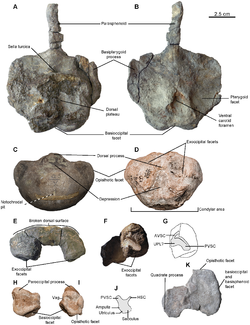Sisteronia
|
Sisteronia Temporal range: Early Cretaceous, Albian |
|
|---|---|
 |
|
| Basicranium of the holotype | |
| Scientific classification | |
| Kingdom: | Animalia |
| Phylum: | Chordata |
| Class: | Reptilia |
| Order: | †Ichthyosauria |
| Family: | †Ophthalmosauridae |
| Subfamily: | †Platypterygiinae |
| Genus: |
†Sisteronia Fischer et al., 2014 |
| Type species | |
|
†Sisteronia seeleyi Fischer et al., 2014 |
|
Sisteronia is an extinct genus of platypterygiine ophthalmosaurid ichthyosaur known from the 'middle' Cretaceous of southeastern England and southeastern France. It contains a single species, Sisteronia seeleyi.
Sisteronia was named by Valentin Fischer, Nathalie Bardet, Myette Guiomar and Pascal Godefroit in 2014 and the type species is Sisteronia seeleyi. The generic name honors Sisteron, a commune in the Alpes-de-Haute-Provence, southeastern France, where relatively complete specimens referable to Sisteronia were collected, including a partial articulated skeleton and at least three additional articulated specimens held in a private collection. The specific name, seeleyi, honors the renowned British paleontologist Harry Govier Seeley who cataloged thousands fragmentary ichthyosaur specimens from the Cambridge Greensand Member of the Lower Chalk Formation. Now housed in the collections of Sedgwick Museum of Earth Sciences (CAMSM), the Royal Belgian Institute of Natural Sciences (IRSNB), The Hunterian Museum (GLAHM), New Walk Museum & Art Gallery (LEICT) and Natural History Museum (NHMUK), most of these specimens have never been reassessed thoroughly since Seeley's publication in 1869, and include the holotype of Sisteronia.
...
Wikipedia
